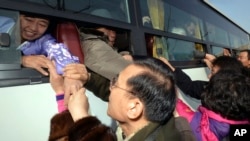Even though both North and South Korea have agreed to hold reunions of separated families next month, the state of tensions on the peninsula means it would likely take little to derail the event.
The reunions were agreed to in August during peace talks between the two Koreas that were held to ease tensions after a landmine border incident nearly escalated into a large-scale military conflict.
The reunions are scheduled for October 20-26 and will be held at the Diamond Mountain resort in North Korea. Each country has selected one hundred people from families that have been separated since the Korean War divided the peninsula in the 1950s.
Many of the selected participants are elderly and view the reunion as a chance to see their loved ones one last time before they die.
However, since then a number of contentious issues have arisen that could cause the reunions to fall apart.
First is the very real possibility that North Korea will launch a long-range rocket on October 10 to celebrate the 70th anniversary of its ruling party. Pyongyang recently announced its intention to conduct a satellite launch and even hinted it might also conduct a fourth nuclear test.
Although North Korea claims its satellite program is for peaceful purposes, western countries say it instead tests intercontinental ballistic missiles, violating a U.N. ban.
Seoul has not explicitly said that a missile launch or nuclear test would force the cancelation of the reunions, but has said such a test would be a "grave provocation" and a "military threat." South Korea would likely join international calls for increased sanctions, and increase its military defense posture, making it difficult to proceed with the family reunions.
Other contentious developments
This week activists in South Korea launched balloons full of anti-Kim Jong Un leaflets across the border into the north. In the past, Pyongyang called the balloon launches provocations and demanded they be stopped before any inter-Korean engagement efforts could proceed. Last October, North Korea fired at balloons carrying leaflets, triggering a brief exchange of fire with South Korea.
South Korea said Monday it would not attempt to restrict the balloon activists raising concern that the North might retaliate by canceling the family reunions.
"Our government's basic position is that [they] cannot be forcibly restricted without some legal basis," said South Korea Unification Ministry spokesman Jeong Joon-hee.
And the United Nations Commission of Inquiry on Human Rights Monday criticized Pyongyang for limiting the number of family members allowed to participate in the reunions.
"It is extremely cruel of the administration of [North Korea] and a breach of fundamental human rights to deny the opportunity for families to be reunited," said Australian judge Michael Kirby.
Kirby also heads the U.N. commission that recommended that the Kim Jong Un government be referred to the International Criminal Court for crimes against humanity after it documented a network of prison camps and systematic atrocities in North Korea.
Kirby says the number of separated family members in South Korea is more than 60,000 and says the North's prevention of regular reunions is barbaric.
North Korea's ambassador at-large, Ri Hung Sik, dismissed Kirby's denouncements saying, "the reunion of these separate families… has nothing to do with Kirby."
The U.N. human rights commission Monday also denounced North Korea for abducting an estimated 200,000 foreign nationals from at least 12 countries including China, Japan, South Korea, and Thailand over the last 50 years.
North Korea admitted in 2002 to kidnapping 13 Japanese citizens, and only five of the abductees and their families have returned to Japan.
North Korea's ambassador characterized the U.N.'s human rights investigations in North Korea as politically motivated and criticized Japan for "internationalizing" the abduction issue.
The U.N.'s efforts to prosecute North Korea for human rights abuses has admittedly made it more difficult to engage the Pyongyang leadership on other issues like nuclear talks and if nothing else it adds pressure to an already tense situation.
Trust building or concessions?
South Korea says it views the organizing of family reunions as a non-political way for the two sides to build trust. But North Korea, in the past, has made last-minute demands for aid and development concessions prior to negotiations.
However Korea analyst Kang Chul-hwan, with the Center for North Korea Strategy in Seoul, is somewhat optimistic that the reunions will take place as planned. He said this time Pyongyang realizes it must first show some good faith if it wants to persuade Seoul to reduce sanctions and increase economic aid.
"For the North Korean government, support from the South Korean government is necessary to resolve its internal economic issue, and in order to persuade the South Korean government, the north needs to work on family reunion," Kang Chul-hwan said.
The last time the two Koreas held family reunions was in 2014. The year before North Korea cancelled planned reunions at the last minute after it claimed the South was trying to overthrow the Pyongyang government.
Youmi Kim in Seoul contributed to this report.





